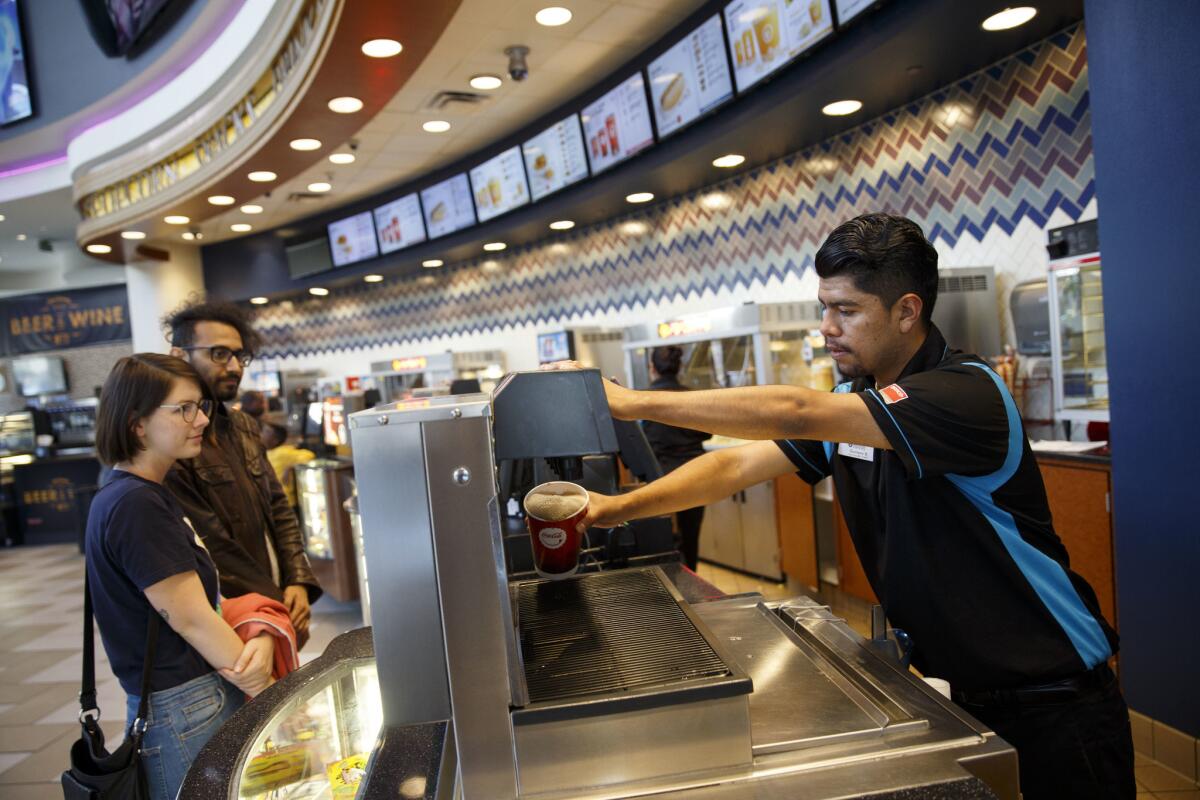Coronavirus closures hammered movie theaters. Now they’re asking Trump for help

- Share via
The coronavirus pandemic has become a real-life horror story for movie theater owners, many of whom may not be able to survive prolonged closures as officials try to slow the spread.
In response, cinemas are lobbying Congress and the Trump administration for financial relief to stay afloat, as most theaters shut their doors indefinitely.
The National Assn. of Theatre Owners, which represents 33,000 screens in all 50 states, on Wednesday asked lawmakers to enact relief measures, including loan guarantees to ease the liquidity squeeze of the shutdown and tax benefits to ensure multiplexes can get back on their feet once they reopen.
“The business model of the movie theater industry is uniquely vulnerable in the present crisis,” the Washington-based trade group said in a statement. “As we confront this evolving and unprecedented period, we call on Congress and the Administration to ensure that America’s movie theater industry and its tens of thousands of employees across the country can remain resilient.”
The latest updates from our reporters in California and around the world
The statement comes after multiple major cities, including Los Angeles and New York, ordered theaters and other venues to close to help mitigate further spread of COVID-19. The largest circuits — AMC Theatres, Regal Cinemas and Cinemark — have shuttered all their U.S. locations.
The situation has prompted concern that some businesses may perish as box-office and concession revenues evaporate for an unknown period of time. Theater stocks have plummeted amid worries that the companies won’t be able to service their debt. Independent theaters, many of which were struggling to stay in business to begin with, are facing an existential threat.
Box office last weekend hit a two-decade low. The closures also prompted studios such as Universal Pictures to offer their recent theatrical releases much earlier than expected through online rental and purchase platforms, a move that would anger theater chains under normal circumstances because it would threaten their business model.
Universal’s DreamWorks Animation movie “Trolls World Tour” will be available April 10, the same day as its scheduled theatrical release, for a 48-hour rental period for $19.99. Sony Pictures on Wednesday said it would release the new Vin Diesel superhero movie “Bloodshot” for online purchase on March 24, also for $20.
But at the moment, theaters are most worried about the immediate financial pressures brought on by the virus, as well as the effects on the exhibition industry’s roughly 150,000 U.S. employees. The theater association on Tuesday said the move to early video on-demand is a one-time fix to a highly unusual event, not a sign of broader changes to come.
Most major releases are getting pushed to later dates, not releases straight to VOD. Walt Disney Co. has delayed its live action remake of “Mulan” and its newest Marvel movie “Black Widow” indefinitely. Universal delayed the new “Fast and the Furious” film “F9” until April 2021.
The cinema industry’s request comes on the day the Senate passed a measure to provide sick leave and free coronavirus testing to Americans. The legislation, which was approved by the House on Saturday, passed 90 to 8 in the Senate and next goes to Trump’s desk for signature.
Congress is already working on the next emergency relief package, expected to top $1 trillion, including aid to struggling industries and individual checks to most taxpayers.
The theater association, in its statement, asked Congress and the White House to consider multiple measures including:
- Loan guarantees that ease a liquidity squeeze imposed by fixed costs in the face of nonexistent revenues.
- Tax benefits to assist employers with providing support to employees.
- Relieving the burden of costs that are ongoing despite closures.
- Tax measures that will allow theaters to recoup losses when the industry is back up and running.
Separately, the association said it had authorized $1 million to be drawn from reserve funds to aid movie theater employees who are out of work due to closures.
“The money will be used as seed funds for an effort to help tide workers over in this crisis in cooperation with our industry partners,” the group said.
More to Read
Inside the business of entertainment
The Wide Shot brings you news, analysis and insights on everything from streaming wars to production — and what it all means for the future.
You may occasionally receive promotional content from the Los Angeles Times.











